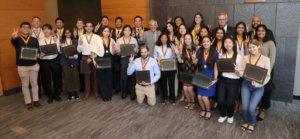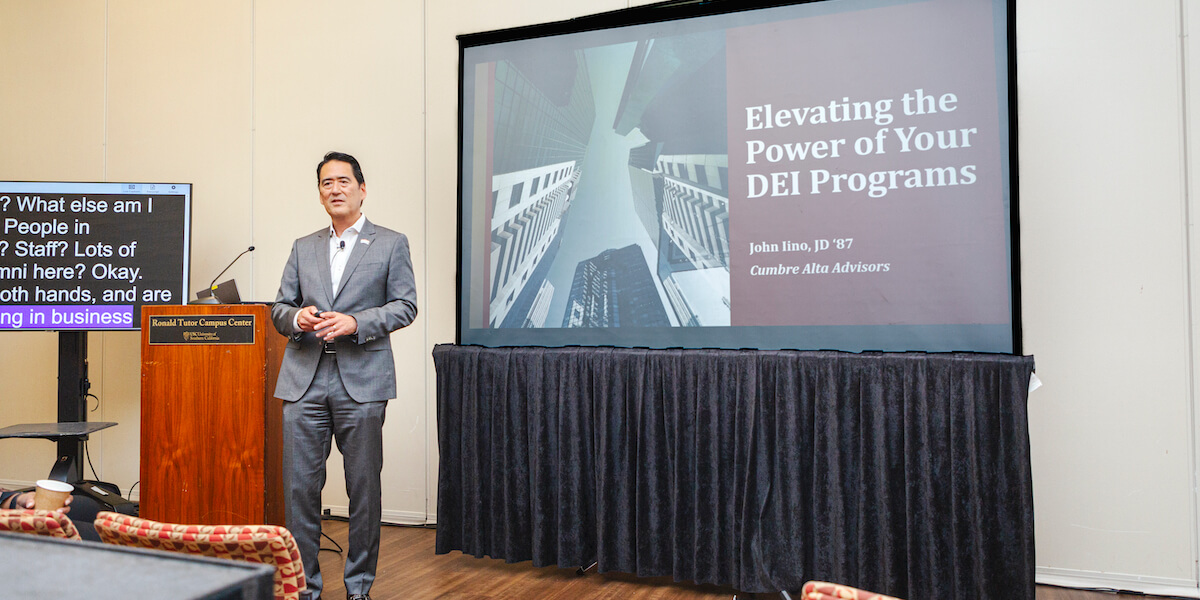
John Iino, USC’s interim associate senior vice president for alumni relations and CEO and founder of Cumbre Alta Advisors, closed the two-day event with a keynote speech about elevating the power of DEI programs. (Photo/Angel Ahabue)
USC Viterbi has proud history of embracing diversity, equity and inclusion, or DEI.
In 1975, the school of engineering established the Minority Engineering Program, later known as the Center for Engineering Diversity (CED), to recruit, retain and graduate Black, Latinx and Native American students. At the time, USC became the first private university in California to fund such a program. Two years later, in 1977, USC Viterbi established USC MESA, one of the nation’s most successful efforts to encourage K – 12 students from minority and disadvantaged groups to consider career paths in science and technology.
Under the leadership of USC Viterbi Dean Yannis C. Yortsos, the school has deepened its commitment to, in his words, “changing the conversation about engineering, who we are, what we do, and what we look like.” In 2017, the American Society for Engineering Education (ASEE) honored USC Viterbi with the prestigious President’s Award for Yortsos’s contributions in creating ASEE’s Deans Diversity Pledge, which more than 210 universities have signed. Recently, CED was renamed the John Brooks Slaughter Center for Engineering Diversity to honor the late DEI pioneer and former USC professor who became the first Black director of the National Science Foundation, among many other singular achievements.
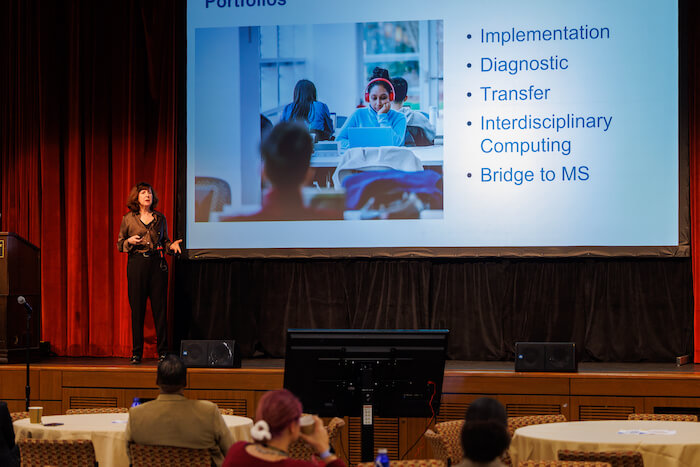
Carla Brodley, dean of inclusive computing at Northeastern University, spoke at the DEI summit. (Photo/Helen Perez)
Against this backdrop, USC Viterbi held the inaugural John Brooks Slaughter Leadership in Engineering DEI Summit on the main campus Feb. 7 and Feb. 8, the university’s first national DEI conference. About 150 participants from across the country attended, including DEI leaders such as Carla Brodley, dean of inclusive computing at Northeastern University; Charles Barber, chief inclusion and diversity officer at the National Science Foundation; Alicia Knoelder, head of the NSF’s office of integrative activities; and faculty presentations from UC Irvine, Georgia Tech, University of Washington, and USC’s Viterbi’s Information Sciences Institute. John Iino, USC’s interim associate senior vice president for alumni relations and CEO and founder of Cumbre Alta Advisors, closed the two-day event.
The summit aimed to “open an inclusive dialogue on DEI and technology and engineering technology and to act as a catalyst for meaningful change,” said Kenneth Bonner, conference chair and USC Viterbi associate dean for inclusion and diversity initiatives.
Topics explored at the summit’s 19 different sessions included how AI could mitigate inequality if better designed; embracing neurodiversity in STEM in faculty and students; and transforming engineering curriculum for health equity. A major conference theme was advancing excellence and equity in engineering education, especially at the intersection of DEI and AI, DEI and health, DEI and games, and DEI and overall student experience.
A more inclusive AI
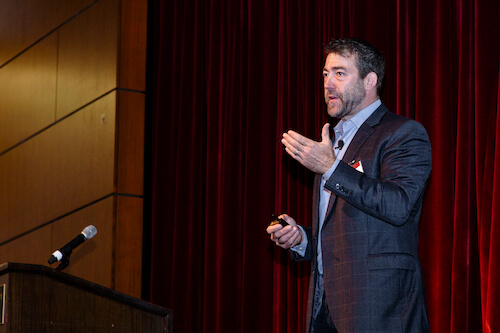
ISI’s Adam Russell delivered the opening keynote address, discussing ways to safeguard and strengthen AI. (Photo/Angel Ahabue)
At the conference, Adam Russell delivered the opening keynote address about ways to safeguard and strengthen AI. The director of the artificial intelligence division at the USC Information Sciences Institute spoke about Ubuntu, an African philosophy that emphasizes humanity’s interconnectedness (“I am, because we are.”) and implies that intelligence should not be thought of as just an individual feature. Instead, he said, evidence shows that intelligence and innovation derive from the “collective brain” through social learning.
Russell applied this concept to AI, calling for a multitude of new voices and perspectives to improve artificial intelligence and to reimagine how and why it’s built and deployed because of AI’s widespread impact.
“Who’s responsible for a biased AI system? Well, the people who build the algorithm,” he said. “But I think it’s worth standing back and figuring out where that bias comes from. It comes from us. We are responsible for making sure there’s more diversity in this space to address that. All of us are needed.”
Phebe Vayanos, an associate professor of industrial and systems engineering and computer science and co-director of the USC Center for AI in Society, shared her research on designing AI to empower vulnerable communities and mitigate inequalities in our society.
She showcased her work to improve the system for matching people experiencing homelessness in Los Angeles to the city’s extremely scarce housing resources, laying out the hard moral trade-offs communities face in deciding whom to prioritize for housing. Through the algorithms that she and her team have designed, Vayanos said that AI could help improve equity and transparency of the housing allocation system while also increasing exits from homelessness by 3%.
“AI research, in collaboration with communities, has the potential to have huge benefits, to help support the most vulnerable, marginalized, and underserved populations, and to mitigate the inequalities that exist in our society,” she said. “Through this work, I hope to get more researchers and communities excited about AI research to support those who need it the most.”
In a breakout session titled “Games and AI: Perspectives, Challenges and Opportunities,” Jim Huntley, associate professor for USC Games, a joint program of the USC School of Cinematic Arts’ Interactive Media & Games and USC Viterbi’s Computer Science Games departments, expressed cautious optimism that, with intentional, transparent, and inclusive planning, artificial intelligence can increase inclusivity in games.
That’s because the people and companies designing and developing games “have their hearts in the right place when it comes to creating entertainment that’s engaging to a majority of people,” he said, adding that infusing their offerings with more diversity makes them appeal to a greater number of players.
“I think you’re going to see increased representation of diverse characters and cultures thanks to AI-driven character creation tools across multiple styles and genres,” said Huntley, who also serves as of the head of marketing for USC Games.
Still, he cautioned, unregulated or AI not trained by people from a variety of ethnicities and backgrounds could inadvertently infuse bias into AI-fueled games. “The risk is letting the power of the technology get ahead of human intent.”
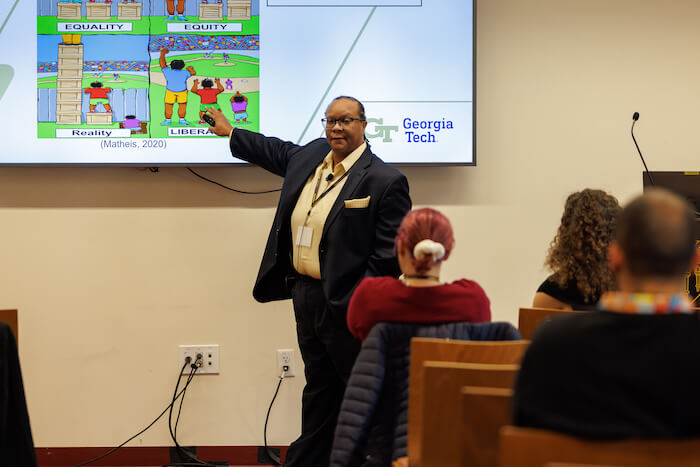
Kelly Cross, an assistant professor of biomedical engineering at Georgia Tech and Emory universities, talked about DEI in STEM. (Photo/Helen Perez)
Participants said they were glad they came to the landmark event.
“I found the conference to be a valuable learning experience, offering insights into DEI across various sectors including leadership, industry, academia, and research,” said Elizabeth Ondula, a USC Viterbi Ph.D. student in computer science. “It provided a welcoming environment where I felt comfortable expressing my thoughts and asking questions without fear of judgment.”
Added Derek Mikuriya, ISI director of human resources: “There’s lots of excellent work being done, but we still have a way to go to educate and change behaviors. But the summit left me feeling positive about the direction we’re heading.”
A celebration of John Brooks Slaughter’s legacy
The spirit of John Brooks Slaughter loomed large over his namesake conference. Slaughter, who served as the first Black president of Occidental College and the first Black chancellor of the University of Maryland, played a major role in planning it, said Bonner, the conference chair. In fact, the decision had been taken to name the summit in tribute to Slaughter before his passing in December 2023 at age 89.
Fittingly, a separate celebration of Slaughter’s life was held at the conclusion of the summit. Speakers at the tribute included USC President Carol Folt, USC Viterbi Dean Yortsos, Occidental President Harry Elam Jr., Jacqueline Randall, John Brooks Slaughter’s daughter, and Wesley Harris, vice president of the National Academy of Engineering.
“John encouraged us to be better, to try harder, and to make a real difference in the lives of talented individuals who need to be recognized and nurtured,” Folt said. “That is his enduring legacy.”
Published on February 15th, 2024
Last updated on November 29th, 2024




